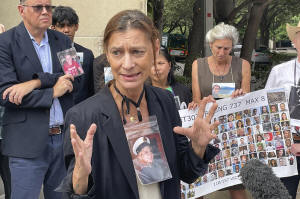Families of Boeing crash victims to make potential final plea for
criminal prosecution
[September 03, 2025] By
JAMIE STENGLE and RIO YAMAT
DALLAS (AP) — A hearing set for Wednesday in federal court in Texas
could provide families of the victims killed in two crashes of Boeing
737 Max jetliners with their final opportunity to demand that the
company face criminal prosecution.
U.S. District Chief Judge Reed O'Connor will hear arguments on a motion
by the federal government to dismiss a felony fraud charge against
Boeing in connection with the crashes that killed 346 people off the
coast of Indonesia and in Ethiopia. In exchange, Boeing said it would
pay or invest another $1.1 billion in fines, compensation for the crash
victims’ families, and internal safety and quality measures.
Prosecutors have said that Boeing deceived government regulators about a
flight-control system that was later implicated in the fatal flights,
which happened less than five months apart in 2018 and 2019.
The hearing in Fort Worth comes more than four years after the Justice
Department first announced it had charged Boeing in January 2021 and
reached a $2.5 billion settlement with the aircraft maker. That deal
would have protected Boeing from criminal prosecution if it strengthened
its ethics and legal compliance programs, but prosecutors revived the
charge last year after they said Boeing had violated the agreement.
Boeing decided to plead guilty instead of going to trial, but in
December 2024, O’Connor rejected that plea agreement. O'Connor, who was
appointed by President George W. Bush, cited concerns he had over how
diversity policies both at the federal government and at Boeing could
influence the selection of an independent monitor charged with
overseeing the company's promised reforms.

Lawyers representing relatives of some of the victims who want a public
trial and for the company to receive more severe financial punishment
welcomed the judge's decision. But the delay worked in Boeing's favor.
The judge’s refusal to accept the agreement meant the company was free
to challenge the Justice Department’s rationale for charging Boeing as a
corporation. It also meant prosecutors would have to secure a new deal
for a guilty plea, and they spent six months renegotiating with Boeing.
During that time, President Donald Trump returned to office and ordered
an end to the diversity initiatives that gave O’Connor pause.
By late May, the two sides struck a new deal that took both the criminal
charge and Boeing's guilty plea off the table. The Justice Department
said it offered those terms in light of “significant changes” Boeing has
made to its quality control and anti-fraud programs since last summer.
O’Connor has invited some of the families to speak on Wednesday. That
includes relatives traveling from France, Ireland and Canada who plan to
ask the judge to deny the government’s request and appoint a special
prosecutor to take over the case, according to lawyers for the families.

[to top of second column] |

Catherine Berthet, whose daughter Camille Geoffrey died in the
March, 2019, crash of an Ethiopian Airlines 737 Max, speaks outside
federal court in Fort Worth, Texas, on Friday, Oct. 11, 2024. (AP
Photo/Dave Koenig,File)
 Chris and Clariss Moore of Toronto,
whose 24-year-old daughter, Danielle, died when a 737 Max crashed
shortly after takeoff from Ethiopia’s Addis Ababa Bole International
Airport, said in a statement that the pending agreement would allow
Boeing to escape justice.
“The safety of passengers will be held in the balance,” the
statement said.
Justice Department lawyers say the families of 110 crash victims
either support resolving the case before it reaches trial or do not
oppose the new deal. The Justice Department has also asked the judge
to leave open the possibility of refiling the conspiracy charge if
the company does not hold up its end of the deal over the next two
years.
The department said it thought that persuading a jury to punish the
company with a criminal conviction would be risky, while the new
deal ensures "meaningful accountability, delivers substantial and
immediate public benefits, and brings finality to a difficult and
complex case whose outcome would otherwise be uncertain.”
While federal judges typically defer to the discretion of
prosecutors in such situations, court approval is not automatic.
The yearslong case centers around a software system that Boeing
developed for the Max, which began flying in 2017.
In the 2018 and 2019 crashes, that software pitched the nose of the
plane down repeatedly based on faulty readings from a single sensor,
and pilots flying then-new planes for Lion Air and Ethiopian
Airlines were unable to regain control. After the Ethiopia crash,
the planes were grounded worldwide for 20 months while the company
redesigned the software.
Investigators found that Boeing did not inform key Federal Aviation
Administration personnel about changes it had made to the software
before regulators set pilot training requirements for the Max and
certified the airliner for flight.

Acting on the incomplete information, prosecutors said, the FAA
approved minimal, computer-based training for Boeing 737 pilots,
avoiding the need for flight simulators that would have made it more
expensive for airlines to adopt the latest version of the jetliner.
The initial 2021 settlement agreement was on the verge of expiring
last year when a panel covering an unused emergency exit blew off a
737 Max during an Alaska Airlines flight over Oregon. No one was
seriously injured, but it put Boeing’s safety record under renewed
scrutiny.
All contents © copyright 2025 Associated Press. All rights reserved |